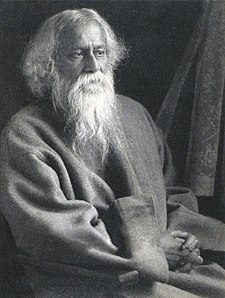Chokher Bali (novel)
| Rabindranath Tagore | |
|---|---|

Tagore (c. 1925)
|
|
| Native name | রবীন্দ্রনাথ ঠাকুর |
| Born | Rabindranath Thakur 7 May 1861 Calcutta, British India |
| Died | 7 August 1941 (aged 80) Calcutta, British India |
| Occupation |
Writer
Painter
|
| Language | Bengali, English |
| Ethnicity | Bengali |
| Literary movement | Contextual Modernism |
| Notable works | Gitanjali, Gora, Ghare-Baire, Jana Gana Mana, Rabindra Sangeet, Amar Shonar Bangla (other works) |
| Notable awards |
Nobel Prize in Literature 1913 |
| Spouse | Mrinalini Devi (m. 1883–1902) |
| Children | 5 (two of whom died in childhood) |
| Relatives | Tagore family |
|
|
|
| Signature | |
Painter
Rabindranath TagoreFRAS (![]() i/rəˈbindrəˈnɑːt ˈtɑːɡɔːr/; Bengali: [robind̪ro nat̪ʰ ʈʰakur]), also written Ravīndranātha Thākura (7 May 1861 – 7 August 1941),sobriquet Gurudev, was a Bengali polymath who reshaped Bengali literature and music, as well as Indian art with Contextual Modernism in the late 19th and early 20th centuries. Author of Gitanjali and its "profoundly sensitive, fresh and beautiful verse", he became the first non-European to win the Nobel Prize in Literature in 1913. Sometimes referred to as "the Bard of Bengal", Tagore's poetic songs were viewed as spiritual and mercurial; however, his "elegant prose and magical poetry" remain largely unknown outside Bengal.
i/rəˈbindrəˈnɑːt ˈtɑːɡɔːr/; Bengali: [robind̪ro nat̪ʰ ʈʰakur]), also written Ravīndranātha Thākura (7 May 1861 – 7 August 1941),sobriquet Gurudev, was a Bengali polymath who reshaped Bengali literature and music, as well as Indian art with Contextual Modernism in the late 19th and early 20th centuries. Author of Gitanjali and its "profoundly sensitive, fresh and beautiful verse", he became the first non-European to win the Nobel Prize in Literature in 1913. Sometimes referred to as "the Bard of Bengal", Tagore's poetic songs were viewed as spiritual and mercurial; however, his "elegant prose and magical poetry" remain largely unknown outside Bengal.
...
Wikipedia
